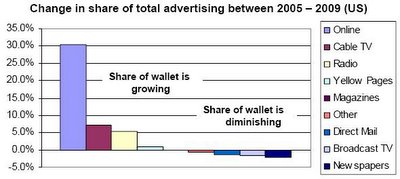
Perhaps proving that legacy U.S. broadcast television networks are deeply concerned about the continued loss of advertiser revenue to online venues, the networks are attempting to reverse the tide with "market research." Google executives must be smiling at this new revelation.
Contrary to earlier evidence that the ability to skip commercials -- enabled by digital video recorders like TiVo -- would negatively impact TV networks, a report issued by the six major networks last week predicts the technology will actually increase viewership, Reuters reported.
"For most of the top television programs, the audience will be greater for these programs as DVR penetration increases," David Poltrack, head of ratings research for CBS, told Reuters. "The DVR is going to increase viewership to major network television programs." The report, issued by CBS, ABC, NBC, Fox, the WB and UPN, found homes with the devices watched an average of 5.7 hours of television daily, versus 5.1 hours for homes without digital video recorders.
The networks also found that, while 90 percent said they skipped all or most commercials, 58 percent "paid attention" to them while fast-forwarding, and 53 percent went back to view an ad of interest.